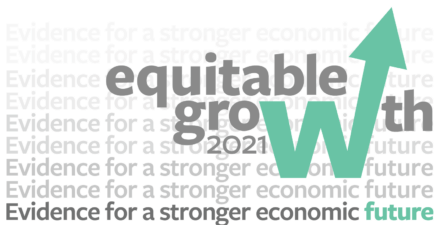Equitable Growth president and CEO addresses conference attendees in first public appearance

Our recent policy conference, “Equitable Growth 2021: Evidence for a Stronger Economic Future,” brought together policymakers, academics, advocates, and thought leaders to discuss the best evidence-based ideas for building a stronger economic future for all Americans. The key themes of the 2-day conference included outlining a vision for sustained public investment in structures and institutions to spur equitable economic growth, with a focus on Black and Indigenous workers and workers of color and how to recover from the pandemic while addressing the ongoing racial, climate, and care crises our nation faces. Below is Equitable Growth President and CEO Michelle Holder’s opening address to the conference.
Hello, and welcome.
Thank you all for joining us for “Equitable Growth 2021: Evidence for a Stronger Economic Future.” I’m Michelle Holder, president and CEO of the Washington Center for Equitable Growth.
Since its inception in 2013, Equitable Growth’s mission has been to advance evidence-backed ideas and policies that promote strong, stable, and broadly shared growth. I’ve admired Equitable Growth from afar for so long, and I’m now thrilled to take the helm as its leader to help further its mission. After all, Equitable Growth’s mission hits home for me.
As a labor economist, my research examines why some groups in the U.S. workforce hold a more favorable status, while other groups hold a less favorable one. I also look at the consequences of this stratification and how it contributes to marginalization and disempowerment—and ultimately less prosperity and slower growth.
My research is informed by my lived experience, which lies at the nexus of characteristics associated with marginalization and cuts right to the heart of the issues affecting the economy today. The economy is not an abstract system that we have no control over. It is made up of people. People like me: a second-generation immigrant, first-generation college graduate, and working mom.
The economy is also a direct result of choices that policymakers make. A new day has dawned in government, and with it comes the possibility for long-overdue structural changes to the economy. The coronavirus pandemic continues to expose deep fragilities in our economy—especially racial and gender inequities—that economic policymakers have a once-in-a-generation opportunity to address.
Broadly shared economic growth is achievable, but a stronger, more equitable future requires deliberate policy choices coupled with a better understanding of what makes the economy grow. This is why I’m so excited to lead Equitable Growth in this moment, and this is why Equitable Growth’s mission is more important and relevant than ever.
Since 2013, Equitable Growth has provided more than $7 million in grants to more than 300 researchers aiming to understand how economic inequality affects growth and stability. Just last month, we announced $1.3 million in grant funding for 2021, a new record for the organization.
And we’ve managed to maintain this growth despite some pretty intense challenges, including the coronavirus pandemic. When the pandemic-induced recession hit, Equitable Growth was prepared. Our vast body of research exploring how inequality leads to a more fragile economy when shocks occur quickly moved from abstract to concrete.
The organization was able to meet the moment, connecting scholars and their research to policymakers desperate for data and recommendations to help guide their work. The result of that collaboration—as well as tireless organizing and advocacy from groups across the country—was the largest public program of economic relief in the nation’s history. Policies that both brought immediate relief amidst the recession and helped lay the groundwork for a more equitable future.
In 2019, for example, Equitable Growth, jointly with The Hamilton Project, published Recession Ready: Fiscal Policies to Stabilize the American Economy, a collection of big ideas and proposals aimed to help policymakers navigate the next recession. We were able to quickly amplify these ideas at the beginning of the coronavirus recession to help policymakers ameliorate the recession’s worst effects.
There are other examples as well. We published the books Vision 2020: Evidence for a Stronger Economy and Boosting Wages for U.S. Workers in the New Economy, which have provided evidence-backed policy ideas for the new administration and Congress. In fact, in the session later today on social infrastructure as an engine for equitable growth, you will hear insights from one of the essayists in Boosting Wages on how the lack of social investments contributes to market failures, such as many families’ inability to find or pay for adequate child care or cushion themselves against unexpected job loss.
Our report, “Restoring Competition in the United States,” helped plant the seeds for a sweeping executive order in July that aims to strengthen antitrust regulation and expand enforcement. We also published an influential paper on tax enforcement, which helped shape the debate around IRS funding.
Our in-house policy experts have extensively promoted ideas and policies ranging from investing in the care economy, to raising wages, understanding market competition, promoting new ways of measuring economic well-being, and combating fiscal austerity.
The list goes on.
We have built a foundation of research and have engaged with policymakers about the necessity for long-term, structural changes to the economy to ensure it works for families up and down the income ladder. In doing so, we’ve helped change the narrative about what makes the economy grow.
But there is more work to be done.
In addition to the pandemic exposing deep fragilities in our economy, 2020 also brought with it a racial reckoning in this country. And we have continued to see the consequences of climate change take hold, most recently with the devastation wrought by Hurricane Ida and the fires in California.
The current moment calls for a vision of sustained public investment in structures and institutions to spur equitable economic growth, with a focus on Black, Indigenous, Latinx, and Asian American workers. The current moment also calls for addressing inequities such as the gender and racial wage and wealth divides, and for centering people in that vision who have been ignored by policymakers for far too long.
And last but not least, the current moment calls for a coherent and comprehensive vision for emerging from the pandemic stronger and more equitable, unafraid of addressing the ongoing and overlapping racial, climate, and care crises our nation faces. Public investments in these areas can spur strong, stable, and broad-based economic growth by addressing longstanding racial and income inequality, driving clean energy and creating good jobs, and jumpstarting a new era of innovation.
This is a moment we must continue to face head on if we want an economy that works for everyone, not just the few.




